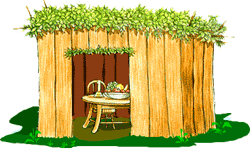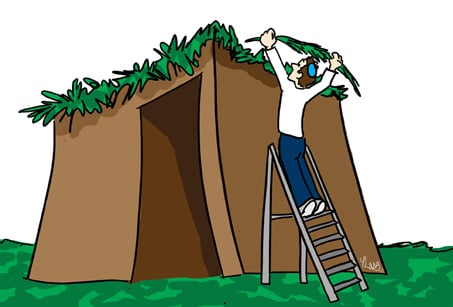
How to Move Beyond Your Shameful Past
An addict uses Judaism's ancient method to move forward after addiction.
by Dr. Jacob L. Freedman A life of drinking, drugs, and rock 'n' roll was infinitely less glamorous than it may have sounded. Even though he had left it behind, my patient had not succeeded in creating a new life for himself. He was unable to form new relationships and unable to fix his old ones. It didn't matter that he'd been sober for the better part of two years; the poor guy was paralyzed with embarrassment.
So hiding in his basement apartment and delivering pizzas, my patient had effectively removed himself from society until a chance meeting with a mutual friend ended in a referral to my office. My new patient was quick to tell me that his previous experiences with therapy hadn't helped at all.
"All therapists want to talk about is the past," he said. "Beyond asking about my mother, all they care about is 'traumatic experiences.' Don't they know that the most traumatic thing to do is to bring up all the bad stuff I did back in the day?"
I agreed with him and said, "And the truth is that you haven't been able to get past it because you're too ashamed to move forward."
"How could I not be ashamed," he wondered. "I once hit someone in the head with a bottle over a girl whose name I can't even remember...I should be proud of that? I spent three months in jail for that one."
"You don't have to be proud of it but you don't need to be ashamed either," I told him. "You've been sober for two years now. The person who did those things is long gone. He's probably still in jail somewhere or maybe even dead for all we know. The person who's sober and sitting here right now is a totally different man."
"What does that even mean?" he asked.
This is the fundamental question that every person who has begun to change their life asks: can I really become a new person or will I always be carrying that baggage along with me?
A person that is sincere in their repentance is a changed human being.
This is also the same question that Maimonides asks in his book, "The Laws of Teshuvah [Repentance]." His answer is clear: a person that is sincere in their repentance is a changed human being. Maimonides teaches that a person who does Teshuvah should say, "I am a different person and not the same one who did those things," (The Laws of Teshuvah 2:4). A true Ba'al Teshuvah – a master of personal change – is an entirely different human being from the individual who previously did the things they came to regret.
Most people have done things they aren't too proud of and want to rectify these prior deeds. One of the most dangerous traps for the person who wants to change their life is shame. An individual who hurt someone else or hurt themselves is often too embarrassed to say "I'm sorry" or too scared to move on; being stuck on the shame of a prior misdoing makes it impossible to ever move forward.
In my office, I've found talk therapies that focus on reliving and re-experiencing trauma facilitate a vicious cycle of shame for patients and don't prepare them for a future filled with new opportunities. This is diametrically opposed to the writings of Maimonides who teaches, "It is a sin to remind a Ba'al Teshuvah of their past," (The Laws of Teshuvah 7:8). A person can't beat themselves up for what they've done and moving forward isn't just advisable, it's the point of the process itself!
My patient had spent two years of sobriety torturing himself for having done a slew of things he could never undo. Until he committed to letting it go, he'd be unable to use his tremendous talents to do anything productive with the rest of his time on in this World.
So I asked him, "You spent years hurting yourself with drugs and alcohol. Do you really think the point of getting sober was to kill yourself with guilt? That part of your life is over, a new chapter's begun."
"What should I do then, just forget about what happened and hit the reset button? Maybe I'll just pretend I never did all those bad things and start a brand new life," he chuckled
"Exactly," I told him. "A brand new life as a sober, smart, and dedicated human being who is finally ready to fix the world, starting right now."
Starting right now for all of us. We've spent Rosh Hashanah thinking about who we want to be in the coming year and Yom Kippur is waiting. Now is the time for teshuvah. And in case you were curious, my patient got better and decided to pursue a career as a music therapist. He spends the rest of his time as a mentor at a sober living facility in Jerusalem.
How is Sukkot Observed? (this guide is for out of Israel)
How Is Sukkot Observed?
 For forty years, as our ancestors traversed the Sinai Desert prior to their entry into the Holy Land, miraculous "clouds of glory" surrounded and hovered over them, shielding them from the dangers and discomforts of the desert. Ever since, we remember G‑d's kindness and reaffirm our trust in His providence by dwelling in a sukkah – a hut of temporary construction with a roof-covering of branches – for the duration of the autumn Sukkot festival. For seven days and nights, we eat all our meals in the sukkah – reciting a special blessing – and otherwise regard it as our home. Weather permitting, some even sleep there.
For forty years, as our ancestors traversed the Sinai Desert prior to their entry into the Holy Land, miraculous "clouds of glory" surrounded and hovered over them, shielding them from the dangers and discomforts of the desert. Ever since, we remember G‑d's kindness and reaffirm our trust in His providence by dwelling in a sukkah – a hut of temporary construction with a roof-covering of branches – for the duration of the autumn Sukkot festival. For seven days and nights, we eat all our meals in the sukkah – reciting a special blessing – and otherwise regard it as our home. Weather permitting, some even sleep there.
| We reaffirm our trust in His providence by dwelling in a sukkah |
Another mitzvah that is unique to Sukkot is the
taking of the Four Kinds: an
etrog (citron), a
lulav (palm frond), at least three
hadassim (myrtle branches) and two
aravot (willow branches). The Midrash tells us that the Four Kinds represent the various types and personalities that comprise the community of Israel, whose intrinsic unity we emphasize on Sukkot.
On each day of the festival (except Shabbat), during the daytime hours, we take the Four Kinds, recite a blessing over them, bring them together in our hands and wave them in all six directions: right, left, forward, up, down and to the rear. (The Four Kinds are also an integral part of the holiday's daily morning service.)
Sukkot is also called The Time of Our Joy; indeed, a special joy pervades the festival. Nightly Water-Drawing Celebrations, reminiscent of the evening-to-dawn festivities held in the Holy Temple in preparation for the drawing of water for use in the festival service, fill the synagogues and streets with song, music, and dance until the wee hours of the morning.
Out of Israel, Sukkot runs from the fifteenth through the twenty-first of Tishrei. The first two days of this festival (in Israel only the first day) are a major holiday, when most forms of work are prohibited. On the preceding nights, women and girls light candles, reciting the appropriate blessings, and we enjoy nightly and daily festive meals, accompanied by the Kiddush. In Israel we have only one day at the beginning and end of the festival.
| Celebrations fill the streets with song and dance until the wee hours of the morning |
The remaining days of the festival are
Chol Hamoed ("intermediate days"), when most forms of work are permitted. We try to avoid going to work, writing, and certain other activities – many families use this time to enjoy fun family outings.
Every day of Sukkot, including Chol Hamoed, we recite the complete Hallel, Hoshanot, and Musaf, and the Torah is read during the morning service.
The seventh day of Sukkot is called Hoshanah Rabbah ("Great Salvation"). According to tradition, the verdict for the new year – which is written on Rosh Hashanah and sealed on Yom Kippur – is not handed down by the Heavenly Court until Hoshanah Rabbah. On this day we encircle the bimah (synagogue reading table) seven times while holding the Four Kinds and offering special prayers for prosperity during the upcoming year. During the course of the morning prayers it is also traditional to take a bundle of five willow branches and beat them against the ground five times.
Sukkot is immediately followed by the independent holiday of Shemini Atzeret/Simchat Torah.
The Sukkah: The Holiday Hut
 What: A sukkah is a hut built to provide shade. That's why it must sit beneath the open sky—not under a patio deck or even the branches of a tree. The walls can be made of any material, as long as they are secure and don't flap about in the wind. The roof, however, (we call it s'chach), must be of unprocessed materials which have grown from the ground. Bamboo poles, thin wooden slats, and evergreen branches are popular choices. Just make sure to use enough s'chach so that the inside of your sukkah will have more shade than sunlight. Those living in the fast lane can buy a prefab sukkah and bamboo mats. Inquire at your local Judaica store, or click here.
What: A sukkah is a hut built to provide shade. That's why it must sit beneath the open sky—not under a patio deck or even the branches of a tree. The walls can be made of any material, as long as they are secure and don't flap about in the wind. The roof, however, (we call it s'chach), must be of unprocessed materials which have grown from the ground. Bamboo poles, thin wooden slats, and evergreen branches are popular choices. Just make sure to use enough s'chach so that the inside of your sukkah will have more shade than sunlight. Those living in the fast lane can buy a prefab sukkah and bamboo mats. Inquire at your local Judaica store, or click here.
| For eight days, make the sukkah your official home |
How: For eight days, make the
sukkah your official home. Don't panic: As long as you eat your meals there, you're okay. But try to include anything else that you would normally do in the house—like reading a book or talking with a friend. We sit in the
sukkah from sundown on the 14th of Tishrei through nightfall of the 22nd of Tishrei.
It is a mitzvah to eat all meals in the sukkah (a "meal" is defined as more than two ounces of grains -- e.g. bread, cake, pasta). Some people have the custom of eating snacks in the sukkah as well. Before eating in the sukkah, the following blessing is recited:
Blessed are You, L‑rd our G‑d, King of the universe, who has sanctified us with His commandments, and commanded us to dwell in the sukkah.
his blessing is made when your meal or snack includes a grain-based food.
Raining? If it's really uncomfortable, there is no duty to sit there. Come back when the weather improves. Nevertheless, many chassidim will eat in the sukkah no matter the weather. It's too great and rare a mitzvah to squander...
It is particularly important to eat at least one k'zayit (approx. 1 oz.) of bread or challah on the first evening of the festival in the sukkah, between nightfall and midnight.
Who: Dwelling in the sukkah is a mitzvah for everyone, though the obligation applies mainly to men over the age of thirteen (children as young as five or six should do so too).
Why: The sukkah commemorates the Clouds of Glory which surrounded and protected our ancestors during the forty-year desert sojourn which followed the Egyptian Exodus. Our willingness to leave the security of our homes and spend eight days in a flimsy outdoor hut demonstrates our faith in G‑d and His benevolence.
The Four Kinds: The Lulav and Etrog
 Every day of Sukkot (except Shabbat) we take the arba minim, a.k.a. "Four Kinds." Sukkot is a seven-day holiday starting on 15 Tishrei and concluding on 21 Tishrei.
Every day of Sukkot (except Shabbat) we take the arba minim, a.k.a. "Four Kinds." Sukkot is a seven-day holiday starting on 15 Tishrei and concluding on 21 Tishrei.
What are the four kinds? A palm branch (lulav), two willows (aravot), a minimum of three myrtles (hadassim) and one citron (etrog). The first three kinds are neatly bundled together—your arba minim vendor can assemble it for you. Click here for a guide to binding the lulav.
Not all sets of arba minim on the market are kosher. Check with your rabbi. And treat your set with TLC—they're fragile goods!
Arba minim is a man's obligation. For women, it's optional but encouraged. Best place for doing this mitzvah is the sukkah, the outdoor holiday booth.
Hold the lulav in your right hand (unless you're a lefty), with its spine facing you. Face east and say:
Blessed are You, L‑rd our G‑d, King of the Universe, who has sanctified us with His commandments and commanded us regarding taking the lulav.
Pick up the etrog in your left hand.
[On the first day of Sukkot (or the first time on Sukkot you get to do this), at this point say:
Blessed are You, L‑rd our G‑d, King of the Universe, who has granted us life, sustained us and enabled us to reach this occasion.]
Bring the lulav and etrog together—you've done the mitzvah!
Nevertheless,
| Treat your set with TLC—they're fragile goods! |
the custom is to wave the
arba minim in all six directions—south, north, east, up, down and west.
Click here for an illustrated guide to shaking the Four Kinds.
Take along your arba minim to the synagogue for the morning services. We wave them again during the Hallel prayer, and then parade them around the synagogue during the Hosha'anot ceremony.
Jewish unity is one of the central themes of Sukkot. The four kinds you are holding symbolize four types of Jews, with differing levels of Torah knowledge and observance. Bringing them together represents our unity as a nation—despite our external differences. So in this spirit of unity, be sure to share your arba minim with your Jewish friends and neighbors!
--







 Joe DiMaggio and Yogi Berra in 1955.
Joe DiMaggio and Yogi Berra in 1955. 

 For forty years, as our ancestors traversed the Sinai Desert prior to their entry into the Holy Land, miraculous "clouds of glory" surrounded and hovered over them, shielding them from the dangers and discomforts of the desert. Ever since, we remember G‑d's kindness and reaffirm our trust in His providence by
For forty years, as our ancestors traversed the Sinai Desert prior to their entry into the Holy Land, miraculous "clouds of glory" surrounded and hovered over them, shielding them from the dangers and discomforts of the desert. Ever since, we remember G‑d's kindness and reaffirm our trust in His providence by  What: A sukkah is a hut built to provide shade. That's why it must sit beneath the open sky—not under a patio deck or even the branches of a tree. The walls can be made of any material, as long as they are secure and don't flap about in the wind. The roof, however, (we call it s'chach), must be of unprocessed materials which have grown from the ground. Bamboo poles, thin wooden slats, and evergreen branches are popular choices. Just make sure to use enough s'chach so that the inside of your sukkah will have more shade than sunlight. Those living in the fast lane can buy a prefab sukkah and bamboo mats. Inquire at your local Judaica store, or
What: A sukkah is a hut built to provide shade. That's why it must sit beneath the open sky—not under a patio deck or even the branches of a tree. The walls can be made of any material, as long as they are secure and don't flap about in the wind. The roof, however, (we call it s'chach), must be of unprocessed materials which have grown from the ground. Bamboo poles, thin wooden slats, and evergreen branches are popular choices. Just make sure to use enough s'chach so that the inside of your sukkah will have more shade than sunlight. Those living in the fast lane can buy a prefab sukkah and bamboo mats. Inquire at your local Judaica store, or  Every day of Sukkot (except Shabbat) we take the arba minim, a.k.a. "Four Kinds." Sukkot is a seven-day holiday starting on 15 Tishrei and concluding on 21 Tishrei.
Every day of Sukkot (except Shabbat) we take the arba minim, a.k.a. "Four Kinds." Sukkot is a seven-day holiday starting on 15 Tishrei and concluding on 21 Tishrei.






















